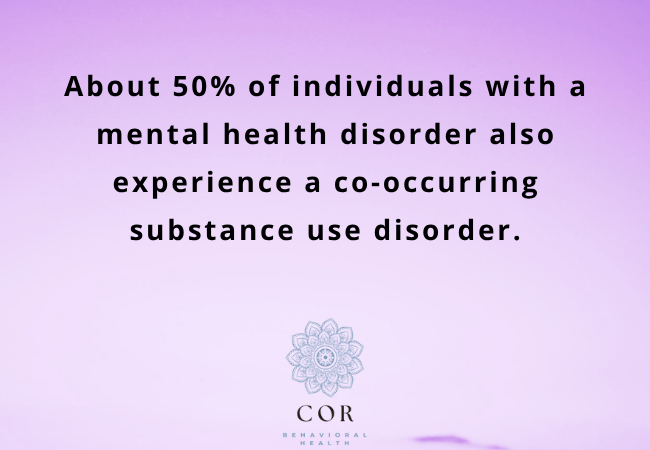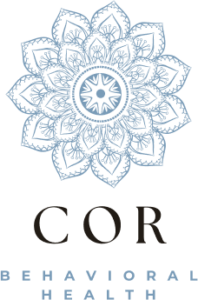
Finding the right mental health treatment can feel overwhelming—especially when emotions are raw, symptoms are severe, or you’re searching on behalf of someone you care about. With so many options available, it’s easy to feel uncertain about where to begin or what level of care is truly needed.
At COR Behavioral Health, we believe that healing starts with clarity and connection. Whether you’re navigating anxiety, depression, trauma, bipolar disorder, or a combination of concerns, our goal is to make mental health care understandable, accessible, and empowering.
This guide will help you explore the different types of mental health treatments in Martin County, Florida, and how to choose the right one for your situation or a loved one’s needs.
Step 1: Understand the Signs That Help Is Needed
Before choosing a treatment path, it’s essential to recognize when professional help is warranted. Some common indicators include:
- Persistent sadness, anxiety, or irritability
- Loss of interest in activities and relationships
- Difficulty concentrating or sleeping
- Mood swings, anger, or impulsivity
- Withdrawal from loved ones or isolation
- Self-harm, suicidal thoughts, or substance use
- A history of trauma, abuse, or overwhelming life events
These signs could suggest underlying conditions like depression, anxiety, bipolar disorder, or trauma-related disorders—all of which can be effectively treated with the right care.
Step 2: Explore the Different Types of Mental Health Treatment
At COR Behavioral Health, we offer a full spectrum of mental health treatments in Martin County, Florida—ranging from outpatient therapy to intensive structured programs.
Here’s a breakdown of the most common options:
1. Individual Therapy
Also known as one-on-one counseling, individual therapy in Martin County, Florida offers a confidential space to explore thoughts, feelings, and behaviors with a licensed therapist. Ideal for:
- Mild to moderate symptoms
- Relationship or work-related stress
- Trauma recovery
- Learning coping tools and emotional regulation
Common modalities include:
- CBT (Cognitive Behavioral Therapy)
- DBT (Dialectical Behavior Therapy)
- EMDR (for trauma processing)
- Mindfulness and somatic approaches
2. Group Therapy
Group therapy in Martin County, Florida provides support and connection with others facing similar struggles. Led by trained facilitators, group therapy:
- Reduces isolation
- Encourages peer accountability
- Helps improve communication and interpersonal skills
- Supports healing through shared experiences
COR offers groups for anxiety, depression, trauma, emotional regulation, relapse prevention, and more.
3. Partial Hospitalization Program (PHP)
Our Partial Hospitalization Program in Martin County, Florida is the highest level of outpatient care—designed for those who need intensive daily support without a hospital stay.
PHP includes:
- 5–6 hours of therapy and skill-building per day
- Individual and group sessions
- Medication management
- Trauma-informed, structured support
Ideal for those with moderate to severe symptoms, recent hospitalizations, or dual diagnoses.
4. Intensive Outpatient Program (IOP)
A step down from PHP, our Intensive Outpatient Program in Martin County, Florida offers structured support several days per week—typically 3–4 hours a day.
IOP is ideal for:
- Stabilizing mental health after a crisis
- Transitioning from inpatient or PHP
- Managing conditions like anxiety, depression, bipolar disorder, or trauma
- Balancing treatment with work, school, or caregiving
5. Medication Management and Psychiatry
For many, medication is a vital part of treatment. Our psychiatric providers offer:
- Comprehensive evaluations
- Personalized medication plans
- Ongoing monitoring and adjustments
- Dual-diagnosis support for co-occurring substance use
Whether you’re managing bipolar disorder, depression, anxiety, or PTSD, medication can reduce distress and improve daily functioning.
Step 3: Match the Right Program to Your (or Your Loved One’s) Needs
Here’s a helpful guide:
| Symptoms/Needs | Recommended Level of Care |
|---|---|
| Mild anxiety or depression | Individual Therapy |
| Struggles with trust or relationships | Group Therapy |
| Severe mood swings, suicidal thoughts, or recent hospitalization | PHP |
| Difficulty managing work/life due to emotional distress | IOP |
| Chronic trauma symptoms (flashbacks, dissociation, hypervigilance) | Trauma-Informed Therapy + IOP or PHP |
| Co-occurring addiction and mental health issues | Integrated Dual Diagnosis Treatment |
Step 4: Consider the Value of Trauma-Informed and Dual Diagnosis Care
At COR Behavioral Health, we recognize that many mental health issues are rooted in trauma. That’s why all our services are trauma-informed, meaning:
- We create safe, respectful environments
- We never force clients to retell painful memories
- We empower clients to move at their own pace
- We recognize symptoms as adaptations—not flaws
Additionally, we specialize in dual diagnosis care through our Addiction and Mental Health Treatment Center in Martin County, Florida. If you or a loved one is struggling with substance use alongside mental health issues, we provide integrated treatment that heals both.
Step 5: Involve Supportive Loved Ones
If you’re supporting someone who’s struggling:
- Listen without judgment
- Encourage open dialogue about emotions
- Offer to attend consultations or intake sessions with them
- Avoid pushing or shaming
- Reassure them that seeking help is a strength—not a weakness
We also offer family therapy and education programs to help loved ones navigate this journey with compassion and clarity.
Step 6: Reach Out for a Personalized Assessment
Still unsure which option is best? Our team at COR Behavioral Health offers confidential consultations to assess your needs and recommend the best path forward.
We’ll explore:
- Symptom severity
- Life circumstances
- Past treatment experiences
- Personal goals
- Co-occurring challenges (e.g., trauma, addiction, chronic illness)
Then, we’ll create a customized plan that matches your pace, your preferences, and your life.

Know the Difference Between Short-Term and Long-Term Treatment Needs
Some individuals may benefit from short-term stabilization, while others need long-term therapeutic support. Consider these factors:
Short-Term Treatment Focuses On:
-
Crisis stabilization
-
Immediate symptom relief
-
Transition from inpatient care
-
Reentry to work, school, or family roles
Long-Term Treatment Supports:
-
Deep trauma work
-
Ongoing mood management
-
Recovery from chronic mental illness
-
Skill-building and emotional resilience
At COR Behavioral Health, we help clients map their treatment journey, adapting services over time—from PHP or IOP to weekly outpatient therapy.
What to Expect in the Intake Process
Understanding the intake process can reduce anxiety for new clients and loved ones. At COR Behavioral Health, we walk you through:
-
Initial Phone Consultation: Brief screening and appointment scheduling
-
Comprehensive Assessment: In-depth evaluation of mental health history, symptoms, goals, and support systems
-
Program Recommendation: Matching you to individual therapy, group therapy, IOP, or PHP
-
Onboarding and Orientation: Meeting your provider, reviewing consent forms, and creating your care plan
Our team answers all your questions and ensures you’re supported from the first contact.
Questions to Ask a Mental Health Provider
Choosing a treatment center or therapist is personal. Here are key questions to ask:
-
What experience do you have with my condition (anxiety, trauma, bipolar, etc.)?
-
What approaches do you use (CBT, EMDR, DBT, etc.)?
-
Do you offer trauma-informed or culturally responsive care?
-
How do you involve family or support systems in treatment?
-
What does success look like here—and how is progress measured?
COR Behavioral Health welcomes these conversations because we want you to feel empowered, informed, and confident in your care.
Why COR Behavioral Health?
Choosing the right treatment starts with choosing the right partner. Here’s why people across Martin County trust us:
- Licensed, compassionate providers trained in trauma-informed care
- Full continuum of services, from therapy to PHP
- Individualized treatment plans tailored to your history and goals
- Specialized care for anxiety, depression, trauma, bipolar disorder, and addiction
- Local, community-rooted support that’s both expert and empathetic
Conclusion
Finding the right mental health treatment is more than checking a box. It’s about finding a path that fits your life, your values, and your goals. Whether you or a loved one is battling anxiety, depression, trauma, or dual diagnosis challenges, the right care can transform pain into progress, and fear into hope.
At COR Behavioral Health, we believe healing starts with compassion—and grows through connection, evidence-based treatment, and unwavering support. With personalized therapy, structured programs like PHP and IOP in Martin County, Florida, and a trauma-informed approach, we meet you exactly where you are—and help you get where you want to be. Call us today at 888.231.7973 to learn more about our mental health treatment programs in Martin County, Florida. The next chapter of your story starts with one brave step. Let us walk beside you.
Frequently Asked Questions (FAQs)
How do I know if I or my loved one needs professional mental health treatment?
If you’re experiencing persistent sadness, anxiety, mood swings, trauma responses, or difficulty functioning in daily life, it’s time to seek help. At COR Behavioral Health, we provide confidential assessments to guide you toward the right level of care.
What’s the difference between individual therapy, IOP, and PHP?
-
Individual therapy is typically weekly talk therapy for mild to moderate symptoms.
-
Intensive Outpatient Program (IOP) is for moderate to severe conditions requiring several hours of treatment a few days per week.
-
Partial Hospitalization Program (PHP) is a full-day, structured program for those needing a higher level of care without inpatient hospitalization.
Can I change treatment levels if my needs evolve?
Absolutely. We frequently help clients step up or step down in care—from PHP to IOP or from IOP to weekly therapy—based on progress and stability. Treatment plans are always customized and flexible.
Do you treat multiple conditions at once (like anxiety and trauma)?
Yes. As an Addiction and Mental Health Treatment Center in Martin County, Florida, we offer integrated care for anxiety, depression, trauma, bipolar disorder, and co-occurring substance use disorders.



